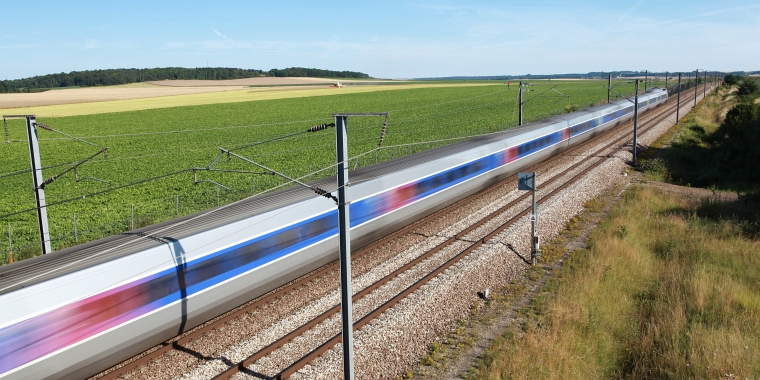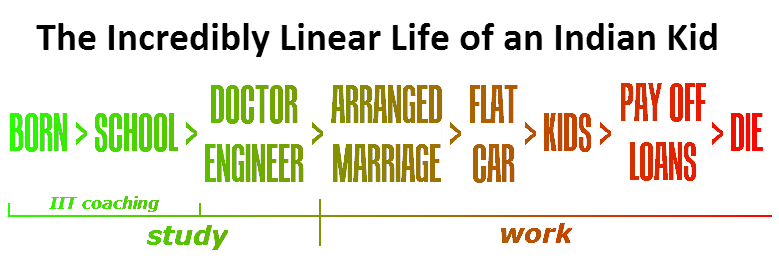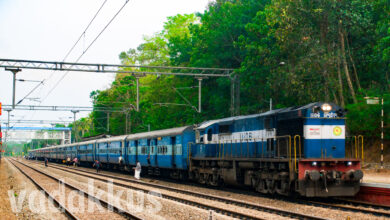How High Speed Rail can transform India

Despite its obvious advantages with regards to speed, capacity and environmental benefits, the general public seem to have many apprehensions when it comes to implementing high speed rail projects in India. Of course, there are a lot many people opposed to the entire concept, many because of misconceptions, some due of other motivations (political, self-agendas) and so on. However, unlike the Americans who staunchly oppose not just high speed rail but all kinds of rail and public transit in general and in principle on the grounds of it all being “Anti-American” and such, people in India seem to be not really opposed to HSR in principle, but seem to be questioning the logic of prioritizing fancy “Bullet Trains” when we have other more pressing problems plaguing the nation, and argue that we should solve those first. While reading through comments posted on articles on Indian HSR, there are two such arguments that seem to be repeatedly popping up:
- Shouldn’t we solve the problem of poverty / corruption / safety of women / etc first?
- Shouldn’t we upgrade our existing tracks / increase speed / safety of existing trains first?
Yes, we need to. No two doubts about that! But these arguments become fallacious when the “first” is added to them. If we wait for all our problems to be fixed before we try to progress in life, we will be stuck here only for all eternity and beyond, grappling with these problems forever. We need to improve our railways and solve problems of poverty etc., but that should not be by opposing high speed rail, or anything else for that matter. We should learn to move ahead in life with our present problems, though that would sound weird to people in India, who have been “conditioned” to view life as a succession of linear events, though we live in one of the most chaotic societies in the world. And it would sound preposterous to people schooled in the old ways, but our current network can be improved and people can be emancipated by introducing high speed rail in India! Magic? No. Economics? Yes.
The Great Indian High Speed Rail Dream – Part 3
Why People Say “solve the poverty problem first and then xyz”
There is one curious thing to be noted here. If there is any opposition to high speed rail is not really the opposition to high speed rail in itself, but just another instance of opposition to anything new or flashy in India. But what is disheartening is to see that even many new-generation yuppies of today who are the biggest proponents of free market startup technology awesomeness also seem to be part of the league of anti-HSR shadows! The reason for this is the conditioning of us as a people, as to how we are taught how “change” should be. As a result of decades of socialist propaganda, when we hear “growth”, “development” and “change”, all that most Indians can think of is “government-driven, controlled, planned, forced, centralized, structured processes in a linear one-after-the-other fashion fueled by the hypercore of five-year plan-type grandiose properties, always following a set plan, path and procedure, stifling free will and never being let to figure out or grow on its own.” Think about it. How children are raised, schools, relationships, careers, everything in India follows this template! Everything is dictatorial.

Before we proceed to understand why that argument is farcical, we need to find why it is being asked in the first place. We still want change to happen driven by the government, in this case by planning and building “better” tracks and maybe doling out freebies to the people “to make them rich”, which is the problem, this insistence on changes / development / transformation to be created forcefully by external factors in a linear this first and then that way rather than automatic and free-willed change driven by the market. This mentality is so entrenched in us Indians thanks to decades of “planning commission” propaganda, that we do not realize how unsustainable it is. This type of change will not be natural or automatic, incentivized or innovation-driven based on competitive realities but on the other hand bureaucratic, dictatorial and artificial, and hence will result only in failure. Our country is the best example for this, when 20 years of free-market, free-will change brought about a thousand times more prosperity than 45 years of planned, externally forced change. Most do not understand that it is always market-based economic models left to grow on their own that bring economic prosperity, not centrally planned models. Read more about this here. But that is not all.
For a long time we were made to inwardly feel guilty of having nice things because a large number of our brethren were poor. Our bare-bones Gandhian values which when distilled down to its essence abhorred wealth creation, much less its flaunting, because “How can you think of making money when so many people are poor?” “But how can poor people get rich if they don’t make money?” you ask, for which the reply was “The government will make them rich, wait until then before trying to get rich“. Now replace “money” and “get rich” with “Bullet Trains”. We waited and waited for the poor to be “forced” become prosperous by means of handouts and reservations but nothing happened. And today the hangover of those days makes us still feel subconsciously guilty of getting nice trains. In fact it is this mentality that is the reason for our infrastructure deficit as a whole. Most Indians no matter how much a child of the liberation they are, subconsciously still live under this humongous collective socialist+conservative hangover, which creates a knee-jerk reaction within us of opposing anything new, which is then overlaid with the brainwashed belief that we should “solve this first and then develop that“.
A question to the “shouldn’t we do xyz first and then build bullet trains” crowd: would you also say “Shouldn’t we make all our village / local roads good and safe first, before building expressways?” or, “Shouldn’t they make Podafone’s network strong enough before introducing smartphones?” or, “Shouldn’t they make primary healthcare centers all-amazing before building super specialty hospitals?” or, “Shouldn’t the Indian defence forces buy enough good rifles and tanks before developing atomic bombs?” Sounds ridiculous, right? There is another lasting Indian trait at display here, which is an offshoot of the above argument: Our overbearing humbleness, possibly born out of inferiority complexes: “Do we really need this? 200 kph is enough for us, we don’t need 300“. Why settle for less when we can have better? Would they say, “Why do we need four lane highways when two lane roads will do well enough?” So why should railways be any different?
“There are so many people without toilets, and we want to build bullet trains!” I read somewhere. There is also this UN statistic that there are more people with mobile phones than there are with toilets in India. People know that the government won’t provide them with free smartphones, so they work to maybe save and buy them, while they know that toilets and such will be provided them as freebies and they don’t care. And more than that, people who raise this argument need to read this. People shit out in the open not because they don’t have / cannot afford toilets but because that is what our culture is, it has got nothing to do with economics! The railways also must stop being freebies. Smartphones are aspirations. What needs to be done is to raise aspirations of people that they will work to meet them and stop demanding for and relying on entitlement such as freebies. This is also why privatization to an extent is a good idea, but we will go there later.
The main motivation behind “India does not need HSR, first we should do blah” argument is the thinking that high speed rail is an unnecessary, expensive showpiece that will deliver no value to India’s poor population, a rich man’s toy at best a fancy exhibit for bragging rights in international circles.
Not so. This myth has been propagated by ignorance, vested interests and misinformation. What was the Mars Mission then? What about the statues of national heroes we are building/have built? What about air travel? Do poor people use them? Doesn’t air travel bring economic progress? Aren’t airports huge job providers? HSR is not a showpiece, it is a necessity to bring about economic progress and change lives in India like never before. HSR is not something fancy we have to build after we are developed, it is to be built before it because it will make us a developed country! In the rest of this chapter we will try to examine the economic benefits of high speed rail and in the next, how it will benefit our existing railway network and further on we will try to dispel some of the myths surrounding it.
How HSR Can Help Help Boost the Economy
Yes, India has millions of poor people, and the HSR is being tarnished as an anti-poor plaything. Nope. How can we emaciate poor people? By giving them handouts or empowering them to become prosperous through jobs and business? Right. High speed rail is going to change the lives of many of those poor people before it will change mine or yours. Empty handouts and freebies will never emancipate people, opportunities to do real work will! Take the IT industry. When computers were first introduced in India, the hullabaloo against it was deafening. But today we all know how the IT industry has transformed India, the indirect beneficiaries of which are many fold of its direct beneficiaries, which has lifted lakhs out of poverty, including the families of many reading this. This is the same way how HSR will transform India.
The primary economic impact a pan-India High Speed Rail network will bring about will be the building of the network itself. This will generate lakhs of jobs directly in planning, construction and maintenance of the network and equipment, and many tens of thousands more in indirect jobs. It will also lead to expansion of a number of allied industries: construction, heavy machinery, transportation, electronics, electrical, logistics, IT and many others including some entirely new industries, all which will mean more money and more economic activity. Moreover, the very commitment by the Indian government to such a big-ticket infrastructure project will in itself generate tremendous investor confidence in India, which hasn’t been great in recent years. And then there is all the foreign exchange that will flow in in the form of FDI. Take the case of Japan. The Shinkansen completely transformed that country and made it into the economic powerhouse it is today, and is the back bone of its economy. Of course, bullet trains cannot solve the poverty problem, but it will help mitigate it.

As described in the previous part, HSR will help save the country tons of money in terms of fuel imports and will also help to build up a healthier populace by cutting down on emissions that are threatening to choke us to death. Since in-city public transit systems like Metro and suburban rail are essential accessories for the success of high speed rail, their construction and design will also help in generating more jobs and more money flow. HSR will boost tourism and allied industries to unprecendented levels which will further boost the economy. And once our technology has become proven and robust enough, we can export it, earning even more money and gain credibility, like we have our PSLV launch vehicles to put satellites of other countries into orbit. HSR should become our very own ingenuously made export material, what cars are to Germany and Japan.
However, the biggest boost HSR will provide is the removal of time loss by cutting down travel times from city to city giving people much more time for productive purposes than wasting time in traveling. This in itself will be a massive boost to the economy – a startup can work from multiple cities for example: a worker can attend a meeting in Bangalore in the morning, reach Hyderabad at lunch time and complete his work in the office there. The tyranny of distance will evaporate into nothingness! No more one day lagging. This will increase our competitiveness to European levels, and in these days of interconnected everythingness, you cannot afford to waste time.
How HSR can Change Ways of Life in India!
Imagine if you could reach Chennai from Bangalore in under an hour, or in less time than most people take to commute from their home to office within Bangalore! Incredible as it may sound, if supported by a robust intra-city transportation network (Suburban rail, BRTS, Metro) at either ends, one can reach from their office in Bangalore to their home in Chennai in under two hours! The stuff dreams are made of, eh? Bangalore – Hyderabad and Ernakulam (door to door) in 3 hours instead of the present 10-12 hours! This in itself will solve most problems that the present migrant worker and student faces. Less time spent traveling = more time spent with friends/family or doing productive work or simply things one loves doing. Weekends can get extended by atleast 24 hours, because you spend the time at home you would otherwise spend in a train or bus! Cities will become bedroom communities for each other, demand of housing in cities will come down, lowering real-estate prices (and hence cost of living), while simultaneously creating another parallel real estate boom in other areas around the HSR stations. There will be less permanent residents in cities, which will reduce pollution and congestion, thereby leading to better quality of life in cities. (Aging) parents can be visited more often and ties with the hometown and the family will remain strong. Alternate careers and businesses can grow and be maintained and so on, all that which is now prohibited by the bane of distance will be made possible.
I could give many more examples, but it won’t do any good because having been in the prison of distance for centuries, our brains won’t be able to even comprehend what transformation our lives would undergo if those distances were suddenly eliminated. Imagine you could get your home in your native town 600 km away from the work place in your city in times lesser than what it takes you to commute within the city today. Everyday. Imagine what all you could do and how it would change the lives of you and your family, the society and the country. When mobile phones started becoming popular around 2004, no one in their wildest dreams could imagine what they would become and how they would impact our society. High Speed Rail will be the next such disruptive technology.

Computer generated image of California HSR. This could be India too.
What if we do not develop a high speed railway system? To meet out long-distance travel need, we will turn to building airports and huge highways, while being unsustainable in the wrong run as technologies already many decades old, will be almost as costly as building a HSR network, with devastating effects on our economy, environment and general well-being of our people, unsuited for a country like India as a whole. Poverty has to be solved, but we cannot wait to eradicate all of poverty, which might as well never happen, instead, we have to ensure that we take the less fortunate along with us by giving them opportunities to rise up in life, instead of hanging on to outdated economic and philosophical principles. Like I said before, if we wait to solve all our problems before we try to move on in life, we won’t get anywhere, ever, which also goes for enhancing our existing network, which we will talk about in the next chapter.
What Are High Speed Railways or “Bullet Trains”?
Advantages of HSR in an Indian Context (vs. Other Transport Modes)
Environmental Benefits of High Speed Rail
Why Build HSR Over Developing Our Existing Network?



